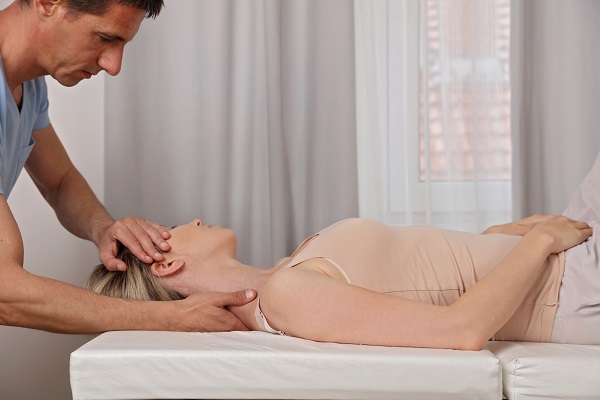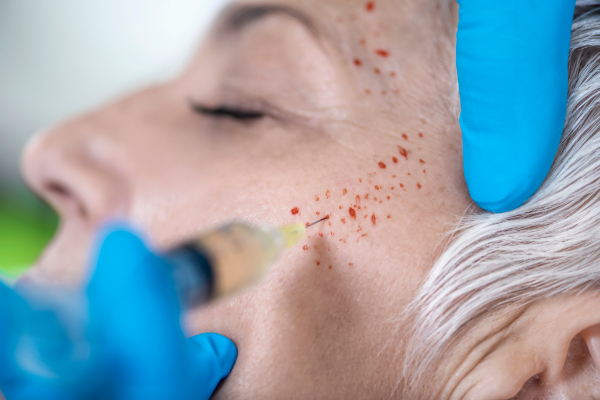Hyaluronic Acid InjectionHillsboro, OH
When knee pain does not improve with first-line treatment, patients may find relief through hyaluronic acid injections. Hyaluronic acid is a common treatment for patients with osteoarthritis, or “OA.” However, it is also a possible treatment option to treat urinary tract infections, dry eyes, leg sores, and acid reflux.
If you or someone you love is struggling with knee pain from osteoarthritis, hyaluronic knee injections may bring relief. Restoration Wellness offers this service to patients in Hillsboro and the surrounding communities. To book an appointment, simply give us a call at (937) 661-6060.
What Is a Hyaluronic Acid Injection?
Hyaluronic acid, or “HA,” is a naturally occurring substance found in joint fluid, eye fluid, and skin. It is a thick, slippery substance with many uses, from hydrating the skin to cushioning the joints. It can ease arthritic pain by replenishing the arthritic joint’s dwindling HA supply to cushion the joint and restore mobility.
Hyaluronic acid injections are also known as viscosupplementation, gel knee injections, and hyaluronic knee injections. These injections can also act as a long-lasting alternative to corticosteroid knee injections. Patients have reported experiencing effects up to six months after the first injection.
The Science Behind Hyaluronic Knee Injections: How It Works
Gel knee injections work by harnessing the natural properties of hyaluronic acid. Its viscosity, for example, makes it an effective lubricant. Hyaluronic acid injections:
- Lubricate the knee joint: Lubrication reduces joint stiffness and friction, preventing the cartilage from wearing away. With better shock absorption, HA can also prevent bone loss. That means a healthier, more mobile joint.
- Reduce inflammation: Gel injections can have long-lasting anti-inflammatory effects, with patients seeing a reduction in pain and swelling for up to four to six months.
- Relieve pain: Besides the pain-relieving effects mentioned above, hyaluronic acid also acts as a nerve block. Research by StatPearls has shown that it surrounds nerve endings and prevents them from sending pain signals to the brain.
Why does viscosupplementation help osteoarthritis of the knee?
Osteoarthritis can make the knee unstable, stiff, and swollen. Its main cause is worn-out or damaged knee cartilage, which allows the bones to rub together. OA can also cause a reduction in synovial fluid — the thick fluid that cushions the joints. With viscosupplementation treatment, it is possible to replenish the arthritic knee’s supply of synovial fluid and renew the cushion.
It can help some people to picture this process as oiling a squeaking door hinge. With enough oil, the door can move around without straining the hinges. Similarly, the patient will be able to use their leg without further straining their arthritic knee.
Efficacy of Hyaluronic Acid Injections for Knee Pain
Clinical studies on the effectiveness of hyaluronic acid injections for knee pain are ongoing. However, several studies have found that hyaluronic knee injections are effective in treating osteoarthritis. A 2016 study published in Seminars in Arthritis and Rheumatism found that hyaluronic acid may provide long-lasting relief, safely delaying the need for knee replacement surgery for up to three years. Another study in 2018 found that some patients benefit from multiple injections. Overall, researchers saw about a 55% decrease in patients’ pain by the end of the study, leading them to conclude that repeated injections are a safe and effective knee osteoarthritis treatment.
Who Should Get Hyaluronic Acid Injections?
Hyaluronic acid injections are a second-line treatment for knee pain from osteoarthritis. In other words, the patient must have already tried some first-line treatments. Physicians will first recommend physical therapy, occupational therapy, exercise, or at-home icing. Medications are also recommended, such as acetaminophen, duloxetine, and nonsteroidal anti-inflammatory drugs, or “NSAIDs,” like ibuprofen.
Our team will consider the patient’s risk factors before administering hyaluronic knee injections. Please note that these injections are only done in the office, under the immediate supervision of a medical professional. Risk factors for gel injections include the patient’s:
- Age
- Allergies
- Medications
- Supplements
- Pregnancy or breastfeeding status
- Preexisting conditions, like knee joint infections
Patients with joint effusion are not good candidates, as their knee joints already have too much synovial fluid. However, it is possible to use hyaluronic acid injections after treating joint effusion. Consult our team for an assessment of one’s risk factors.
What To Expect When Getting Hyaluronic Knee Injections
Hyaluronic acid is injected directly into the arthritic knee joint. If needed, our team may first inject local anesthesia into the area. The gel injection itself takes as long as any other shot. Patients have reported feeling pain and swelling in the injected knee afterward. Fluid buildup may also occur. To help prevent these side effects, rest and ice the injected knee. Make sure to avoid weight-bearing activities, like jogging, for a couple of days.
It is common for patients to temporarily experience difficulty moving, knee stiffness, or redness in the knee that will not go away. In some cases, patients may also experience varying levels of bleeding, burning sensation, skin discoloration, a noticeable rash, numbness, tingling, warmth, and infection at the site of injection. However, these are uncommon. Call our office if any of the patient’s side effects persist or worsen.
Schedule an Appointment Today
Restoration Wellness strives to help patients find relief from the pain and discomfort of knee osteoarthritis. Contact our office in Hillsboro for more information about hyaluronic acid injections by calling (937) 661-6060.
Frequently Asked Questions
Q. How many hyaluronic knee injections do you need?
A. Hyaluronic acid is administered as a series of injections. This is because patients generally need more than one hyaluronic acid injection to see results. Three or five shots will be administered, each a week apart.
Q. How long do hyaluronic acid injections last for knee pain?
A. Successful hyaluronic acid injections provide relief and improve symptoms for up to six months. For this reason, many patients will return for another round of injections every six months or so. Please note that the pain relief is not immediate; patients typically report noticing improvements about eight to 12 weeks after the first gel injection.
Q. Why does my knee hurt worse after a gel injection?
A. >It is normal for an arthritic knee to hurt immediately after a gel injection. If the pain lasts longer than a couple of days, or if it gets worse, call our office for medical advice. Make sure to rest and ice the knee in the days after the injection to reduce the chances of pain, discomfort, swelling, and complications.
Q. Can you walk after a gel injection?
A. Yes, it is okay to walk after getting a hyaluronic knee injection. Heavy exercise and weight-bearing activities are not recommended for at least 24 hours. Some patients benefit from resting for up to 48 hours.
Q. Is viscosupplementation for osteoarthritis covered by insurance?
A. Insurance generally covers gel injections for knee pain from osteoarthritis. Some insurance companies even request that patients ask their doctors about knee injections before getting knee replacement surgery. It is recommended that the patient confirm their insurance policy covers hyaluronic acid injections before scheduling a shot.





